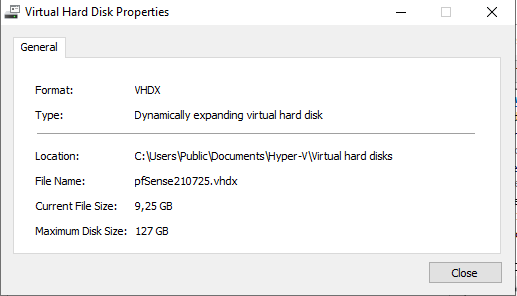PfSense Hyper-V .vhdx growing like crazy
-
@mrchris Mine is two month old and is 10 Gigs in size. But I delete the logs almost daily.
1% of 119GiB - ufs
Filesystem Size Used Avail Capacity Mounted on /dev/gptid/... 119G 1.5G 108G 1% / devfs 1.0K 1.0K 0B 100% /dev /dev/md0 3.4M 200K 2.9M 6% /var/run /lib 119G 1.5G 108G 1% /var/unbound/lib devfs 1.0K 1.0K 0B 100% /var/unbound/dev /var/log/pfblockerng 119G 1.5G 108G 1% /var/unbound/var/log/pfblockerng /usr/local/share/GeoIP 119G 1.5G 108G 1% /var/unbound/usr/local/share/GeoIP /usr/local/bin 119G 1.5G 108G 1% /var/unbound/usr/local/bin /usr/local/lib 119G 1.5G 108G 1% /var/unbound/usr/local/lib devfs 1.0K 1.0K 0B 100% /var/dhcpd/dev

-
@mrchris What are you looking at that makes you believe you're missing this space? Your df output shows only 1% of your disk is used.
-
@kom
When I view the actual VHDX file (pfsense harddrive image) on my Windows Hyper-V Host. Its 85GB in size. About a week ago after I was all done setting it up and getting it running the way I wanted, the VHDX was about 5GB or so which was perfectly fine. After sitting running for about a week with little to no changes to the config the VHDX has grown way more than I would have expected.~MC
-
TBH I dont think its a file in the FreeBSD image as much as the VHDX went rouge or something. I mounted the VHD on another linux host and browsed around it and dont see any crazy large files.
-
@mrchris I'm a VMware guy so I don't have anything to say about your HypverV config. Maybe their changed-block tracking took a dump or got confused. You could try installing to a new VM and then restoring your config. What's important is that pfSense doesn't think it has a problem, so at worst you're out 120G of space on your SAN.
-
As much as I wish this is a SAN, its not :). Its a pretty beefy home server with lots of memory and cpu. my home router took a dump and all my other arm based routers cant actually handle gig up/down and have herd lots of good stuff about pfsense. All my old boxes didnt support AES or were too old. So I decided to play with it and see if I could build a PfSense Home Router/Firewall in a VM while utilizing 2 of the many NICs I have on the server while handling GB up and GB down on WAN/LAN. After a week or so of fumbling around. I did it. yay me. I make regular webui config backups. but also like to get backups of the OS Image too. but with a VHDX going rouge that makes it difficult. I have lots of space to work with but not that much to waste.
The Host is a Windows host and I like to keep it that way at all odds. I may give VMware a play with and see whats up. Or maybe rebuild a new hyper-v image and restore config etc..
I mainly wanted to check if anyone else has seen this behavior with pfsense in a hyper-v setup. I have experience with linux but never really played with FreeBSD. Im more a debian person myself! :)
Other than that I am impressed with PfSense. I like it and kinda wanna keep it in my mix if possible.
Thanks for the feedback!
~MC
-
Hello!
I have seen this on *nix running in hyperv with dynamic vhdx files. Check the blocksize with get-vhd. You might see this wild growth with some guest filesystems if your vhdx is using the default blocksize of 32M. Optimize-vhd can have mixed results trying to compact these filesystems. Using a smaller blocksizebytes, like 1M, when creating a dynamic vhdx can slow, but not eliminate, the excessive growth. I have defaulted to just using fixed size vhdx files in most cases and not messing around with the maintenance or the inevitable wasted space.
John
-
@mrchris Unless you need the space you could just create a smaller disk. Netgate appliances have as little as 8 GB, and there's not much need for more without something like Squid caching or large log files. Can't get bigger than what it is. :)
-
@serbus
good point! I didnt think of that.@SteveITS
This makes sense as it doesnt look like its a file on the pfsense filesystem that is growing and eating space as much as the dynamic vhdx itsself. I will see about creating a new 8GB flat vhdx and seeing how it behaves. I don't need any crazy caching or anything that I know of. Thanks for the info folks. much appreciated.~MC
-
You can see my VM specs in my sig, on 2012R2. No issues.
[2.5.2-RELEASE][root@fw.workgroup]/: df -h Filesystem Size Used Avail Capacity Mounted on pfSense/ROOT/default 5.0G 823M 4.2G 16% / devfs 1.0K 1.0K 0B 100% /dev pfSense/tmp 4.2G 552K 4.2G 0% /tmp pfSense/cf 4.2G 96K 4.2G 0% /cf pfSense/var 4.2G 17M 4.2G 0% /var pfSense 4.2G 96K 4.2G 0% /pfSense pfSense/home 4.2G 128K 4.2G 0% /home pfSense/cf/conf 4.2G 8.9M 4.2G 0% /cf/conf pfSense/var/cache 4.4G 213M 4.2G 5% /var/cache pfSense/var/log 4.2G 1.2M 4.2G 0% /var/log pfSense/var/db 4.3G 129M 4.2G 3% /var/db pfSense/var/empty 4.2G 96K 4.2G 0% /var/empty pfSense/var/tmp 4.2G 120K 4.2G 0% /var/tmp /dev/md0 3.4M 132K 3.0M 4% /var/run devfs 1.0K 1.0K 0B 100% /var/dhcpd/dev -
I hit this when I tried using ZFS as the file system with expanding disks. It went runaway and eventually caused an outage.
I've been meaning to go back and try again with a fixed size disk instead of an expanding one, but haven't got around to it yet, and EXT seems to be fine...
-
S serbus referenced this topic on
-
S serbus referenced this topic on
-
 B Bob.Dig referenced this topic on
B Bob.Dig referenced this topic on
-
 B Bob.Dig referenced this topic on
B Bob.Dig referenced this topic on
-
S serbus referenced this topic on
-
S sloopbun referenced this topic on
-
 G Gertjan referenced this topic on
G Gertjan referenced this topic on